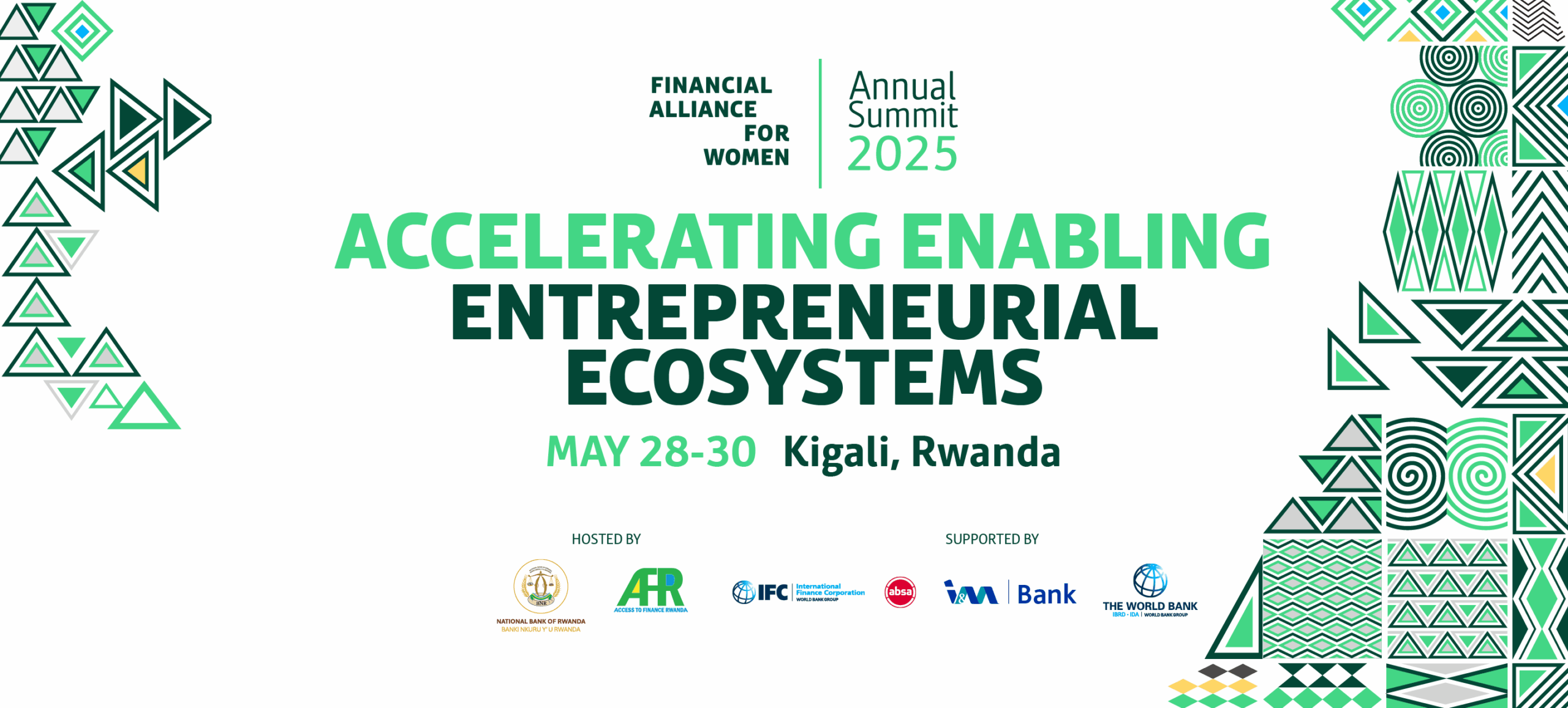Summit Day 1: May 28, 2025
WE Finance Code Rwanda Launch
PANEL I
We Finance Code: National Champions
Key Rwandan stakeholders’ share their perspectives on why the Code is useful for advancing women’s financial inclusion through systemic reform and institutional alignment.
Moderator
Jean Bosco Iyacu, CEO, Access to Finance Rwanda
Discussants
Toni J. Weis, Financial Sector Specialist, World Bank Africa Gender Innovation Lab
Dr. Diane Karusisi, CEO, Bank of Kigali, Rwanda
Pitchette Kampeta Sayinzoga, CEO, Development Bank Rwanda
Valence Kimenyi, Executive Director, Financial Sector Development and Conduct, National Bank of Rwanda
Key Takeaways
Inclusive Design Over Retrofitting
Financial products and services must be intentionally designed for women—adapting male-centric models won’t close gender gaps. Institutions must reshape the financial ecosystem to match women’s realities rather than forcing women to fit the status quo.
Sector-Wide Alignment and Collective Action:
True progress requires collaboration across the financial system—from central banks to commercial institutions. The WE Finance Code acts as a unifying framework, encouraging joint accountability, not siloed efforts.
Data and Leadership Drive Change
Local, sex-disaggregated data is essential to debunk harmful myths about women-led SMEs. Simultaneously, banks must lead by example internally through inclusive leadership, gender-intelligent policies, and proactive financial literacy efforts—especially in digital channels.
PANEL II
We Finance Code: Insights from global champions
The WE Finance Code aims to engage countries and financial service providers (“FSPs”) to significantly accelerate financing for hundreds of thousands of women-led businesses around the world. Panelists share how the Code is working to create a more female friendly entrepreneurial ecosystem.
Moderator
Wendy Teleki, Head, We-Fi Secretariat, World Bank, United States
Discussants
Dalma Hernandez, Manager of Social Banking, Bankers Association of the Dominican Republic
Temitope Akin-Fadeyi, Head, Financial Inclusion Delivery Unit, Central Bank of Nigeria
Khaled Bassiouny, General Manager, Financial Inclusion Department, Central Bank of Egypt
Key Takeaways
Strong
Institutional Collaboration
Engagement between Central Banks, other financial sector regulators, trade associations and the private sector drives deeper systemic inclusion.
Data Is
Foundational
Tools like Nigeria’s WFID dashboard, Egypt’s linking of National IDs to accounts and setting a national definition of women-owed/led businesses enable market transparency and informed product/policy design.
Regulatory Innovation Expands Access
Egypt’s creation of informal business accounts and simplified KYC shows that smart regulation can bridge formality gaps without imposing heavy burdens.
<br
Annual Summit: Accelerating Enabling Entrepreneurial Ecosystems
PANEL III
Unblocking Debt Finance For Women Entrepreneurs In Africa
Financing very small enterprises (VSEs) remains a huge challenge, falling between microfinance and conventional SME bank lending—yet it is where many women entrepreneurs are. Alliance members are meeting the challenge, using cash-flow based lending thus minimizing collateral required and integrating technology to lower costs. Panelists explore key success factors, business results and remaining challenges for banks to fully serve this segment.
Moderator
Greta Bull, Director, Women’s Economic Empowerment, Gates Foundation, United States
Discussants
Naomi Ndele, Head of SME and Agribusiness, Kenya Commercial Bank, Kenya
Beatrice Lugalambi, General Manager Corporate Communications and Marketing, Centenary Bank, Uganda
Henry Chinedu Obike, Chief Innovation Officer, I&M Bank, Rwanda
Key Takeaways
Cashflow-Based Lending Is Key
Cashflow-based lending complemented by peer guarantees minimizes need for traditional collateral. Requires staff retraining, but pays off.
Evidence Drives Scale
Significant uptick in number of women served, lower NPLs, higher net promoter scores and ability to do risk based pricing.
Partnerships Are Catalysts
Strategic alliances with DFIs and fintechs enable banks to lower capital costs and offer supportive pricing, essential for reaching underserved segments.
PANEL IV
Harnessing Capital Markets To Finance Women MSMEs
The gender bond space is rapidly expanding, with USD 116 billion in bonds featuring a gender component issued to date—though most are not gender-exclusive. IFC research shows that only ~40% of 1,000 global issuances had credible definitions, KPIs, and transparent tracking mechanisms. Exceptions include those issued by Alliance members whose lessons were drawn out.
Moderator
Jessica Schnabel, Global Head of Banking on Women, International Finance Corporation
Discussants
Marcia Diaz, Head of Strategy – SMEs and Corporates, Banco Pichincha, Ecuador
Beatrice Mwambije, Senior Manager Liability Products, NMB Bank, Tanzania
Siongo Kisoso, Managing Director, BK Capital, Rwanda
Key Takeaways
Structured Processes Matter
Successful gender bond issuances rely on well-defined end-to-end processes, impact KPIs, and strong sex disaggregated data capability.
Investor Interest Is Growing
ESG-conscious investors, including pension funds, are increasingly seeking credible gender-linked financial instruments— proof of impact and second-party verification are both critical.
Early Pioneers Offer Playbooks
From NMB Tanzania to Banco Pichincha, the most effective issuers combine delivery to WMSMEs, strong internal communication and stakeholder buy-in, and regulatory cooperation.
PANEL V
Leadership Forum: Leading through change
Executives share how to get greater representation of women in senior management roles, its importance to driving women’s financial inclusion and that framing gender equality as an economic imperative is even more important during the current pushback against DEI.
Moderator
Inez Murray, CEO, Financial Alliance For Women
Discussants
Aishah Ahmad, CFA, OFR, Finance & Policy Strategist and Former Deputy Governor, Central Bank of Nigeria , Member Financial Alliance for Women Board
Lindelwe Zwane, Chief Compliance Officer, ABSA CIB, South Africa
Carine Umutoni, Managing Director, Ecobank, Rwanda
Key Takeaways
Sponsorship Not Mentorship
The power of structured sponsorship over mentorship for women’s career progression.
Measure What Matters
Success in women’s representation in leadership must be tracked through concrete metrics.
Key Policy Levers
Flexible work, re-entry strategies after maternity, and DEI-aligned policy reform are foundational for women’s inclusion as employees and as consumers of financial services.
